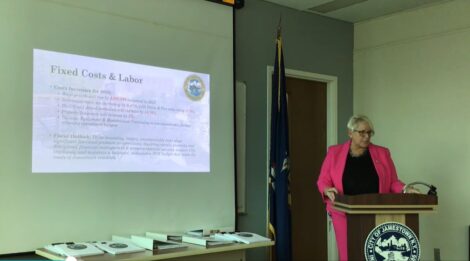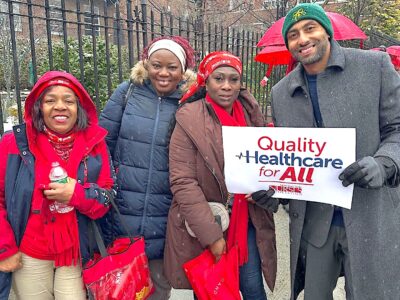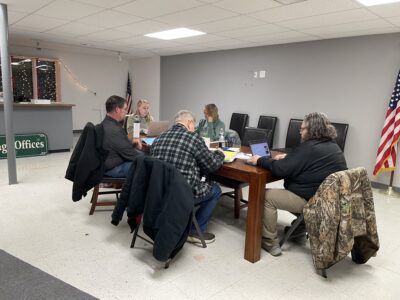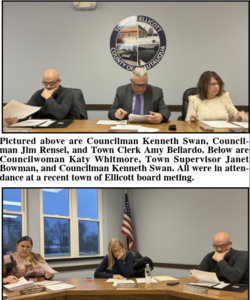NFI Group Navigating Tariff Turmoil

Some of those attending or presenting at the recent Retool’24 conference hosted by the Jamestown Board of Public Utilities and regional organizations, are pictured during a tour of the New Flyer manufacturing plant in Jamestown.
NFI Group, owner of the New Flyer manufacturing plant on Fluvanna Avenue, Jamestown, is still trying to navigate the global trade war that has erupted over the past six months.
The company recently announced a record backlog of $13.7 billion, first quarter revenues of $841.4 million, an increase of 16.4% compared to the first quarter of 2024, and a $94 million gross margin, an increase of 36.3% compared to the first quarter of 2024. EBITDA, short for Earnings Before Interest, Taxes, Depreciation, and Amortization, is a financial metric used to assess a company’s profitability and operating performance. NFI Group’s first quarter EBITDA was $62.7 million, an increase of 84.4% from the first quarter of 2024 – though the company’s first quarter net loss still totaled $6.5 million, an improvement of $2.9 million from the first quarter of 2024.
“We started 2025 and saw continued momentum that we experienced in the fourth quarter of 2024,” said Paul Soubry, NFI Group CEO. “Our manufacturing segment margins have improved as we expected, and the aftermarket business remains a very strong contributor. We achieved several major milestones in the quarter including our highest ever zero-emission deliveries and yet another total backlog increase driven by strong quarterly demand. We continue to work our way through the specific seat supplier related disruption, and we remain confident in our detailed action plan to address this issue.”
But the big news for NFI Group, as has been a recurring theme for many companies with manufacturing plants in the Jamestown area, is the effect of President Donald Trump’s tariffs on their bottom lines.
NFI is taking numerous actions to alleviate the impacts of U.S. and Canadian tariffs, including leveraging the company’s localized production facilities – like its plant in Jamestown and elsewhere in the United States – and its regionalized service and aftermarket parts distribution networks, and contractual terms of its firm orders. NFI Group officials said there remains a significant amount of imports and exports of parts, components, partially and fully assembled buses that travel across the U.S. and Canada border.
During the first quarter, NFI was subject to tariffs on imports of steel and aluminum in the U.S. and Canada, and tariffs on imports of goods from China. The company’s finished buses and coaches, completed in Canada or the U.S., and bus shells started in Canada, currently move between the U.S. and Canada without additional tariffs under the provisions of the United States, Mexico and Canada Free Trade Agreement (USMCA).
Going forward, NFI anticipates that the impact of tariffs will increase with U.S. tariffs now in effect on imports from most countries and as suppliers increase prices to reflect the impact of those tariffs. NFI anticipates that a significant portion of increased costs resulting from U.S. and Canadian tariffs impacting its public transit buses and public motorcoaches can be passed on to end customers through contractual obligations and through general price increases. This is likely to require negotiation with customers and such contractual protections may not cover all costs or be effective for extended periods.
It may be more difficult to pass on the impacts of increased input costs in private coach markets, as they do not have the same contractual terms. NFI anticipates that tariffs may lead to a reduction in private coach demand and associated production within North America. In addition, there may also be near-term cash flow implications due to the payment timing of tariffs and there may also be a decrease in order sizes due to higher prices.
“It’s difficult to project an exact financial impact of tariffs,” Soubry said. “But we are monitoring this closely and feel less exposed than other OEMs in the automotive or trucking industry, especially those that import significantly from outside North America. We will continue to collaborate with our customers, our suppliers, and work with our industry and government partners on the near front to as much as we can to alleviate risks, and we’ll also provide updates to our shareholders as things develop.”
NFI group did receive some good news when it learned that U.S. government funding appropriations for 2025 bus and coach orders aren’t expected to be cut. U.S. funding policy developments may evolve in unpredictable ways, particularly in the case of electric vehicles, which may have material impacts on NFI Group’s future orders and option conversion. NFI Group officials said the company’s fuel agnostic engines should shield the company from cuts to zero emission bus funding.
“We can provide whatever products make sense for our customers and generally internal combustion engine production historically and currently has been less demanding than building zero-emission buses, which provides an opportunity to increase throughput should we see a shift in propulsion system model demand,” Soubry said.






